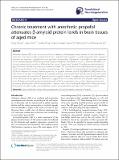| dc.contributor.author | Zhang, Yiying | en_US |
| dc.contributor.author | Shao, Haijun | en_US |
| dc.contributor.author | Dong, Yuanlin | en_US |
| dc.contributor.author | Swain, Celeste A | en_US |
| dc.contributor.author | Yu, Buwei | en_US |
| dc.contributor.author | Xia, Weiming | en_US |
| dc.contributor.author | Xie, Zhongcong | en_US |
| dc.date.accessioned | 2014-05-06T16:18:01Z | |
| dc.date.issued | 2014 | en_US |
| dc.identifier.citation | Zhang, Yiying, Haijun Shao, Yuanlin Dong, Celeste A Swain, Buwei Yu, Weiming Xia, and Zhongcong Xie. 2014. “Chronic treatment with anesthetic propofol attenuates β-amyloid protein levels in brain tissues of aged mice.” Translational Neurodegeneration 3 (1): 8. doi:10.1186/2047-9158-3-8. http://dx.doi.org/10.1186/2047-9158-3-8. | en |
| dc.identifier.issn | 2047-9158 | en |
| dc.identifier.uri | http://nrs.harvard.edu/urn-3:HUL.InstRepos:12152960 | |
| dc.description.abstract | Alzheimer’s disease (AD) is the most common form of dementia. At the present time, however, AD still lacks effective treatments. Our recent studies showed that chronic treatment with anesthetic propofol attenuated brain caspase-3 activation and improved cognitive function in aged mice. Accumulation of β-amyloid protein (Aβ) is a major component of the neuropathogenesis of AD dementia and cognitive impairment. We therefore set out to determine the effects of chronic treatment with propofol on Aβ levels in brain tissues of aged mice. Propofol (50 mg/kg) was administrated to aged (18 month-old) wild-type mice once a week for 8 weeks. The brain tissues of mice were harvested one day after the final propofol treatment. The harvested brain tissues were then subjected to enzyme-linked immunosorbent assay (ELISA) and Western blot analysis. Here we report that the propofol treatment reduced Aβ (Aβ40 and Aβ42) levels in the brain tissues of the aged mice. Moreover, the propofol treatment decreased the levels of β-site amyloid precursor protein cleaving enzyme (the enzyme for Aβ generation), and increased the levels of neprilysin (the enzyme for Aβ degradation) in the brain tissues of the aged mice. These results suggested that the chronic treatment with propofol might reduce brain Aβ levels potentially via decreasing brain levels of β-site amyloid precursor protein cleaving enzyme, thus decreasing Aβ generation; and via increasing brain neprilysin levels, thus increasing Aβ degradation. These preliminary findings from our pilot studies have established a system and postulated a new hypothesis for future research. | en |
| dc.language.iso | en_US | en |
| dc.publisher | BioMed Central | en |
| dc.relation.isversionof | doi:10.1186/2047-9158-3-8 | en |
| dc.relation.hasversion | http://www.ncbi.nlm.nih.gov/pmc/articles/PMC3989795/pdf/ | en |
| dash.license | LAA | en_US |
| dc.subject | Aging | en |
| dc.subject | Alzheimer’s disease | en |
| dc.subject | Neurodegeneration | en |
| dc.subject | β-amyloid peptide | en |
| dc.subject | Anesthesia | en |
| dc.subject | Propofol | en |
| dc.title | Chronic treatment with anesthetic propofol attenuates β-amyloid protein levels in brain tissues of aged mice | en |
| dc.type | Journal Article | en_US |
| dc.description.version | Version of Record | en |
| dc.relation.journal | Translational Neurodegeneration | en |
| dash.depositing.author | Zhang, Yiying | en_US |
| dc.date.available | 2014-05-06T16:18:01Z | |
| dc.identifier.doi | 10.1186/2047-9158-3-8 | * |
| dash.contributor.affiliated | Zhang, Yiying | |
| dash.contributor.affiliated | Xie, Zhongcong | |


